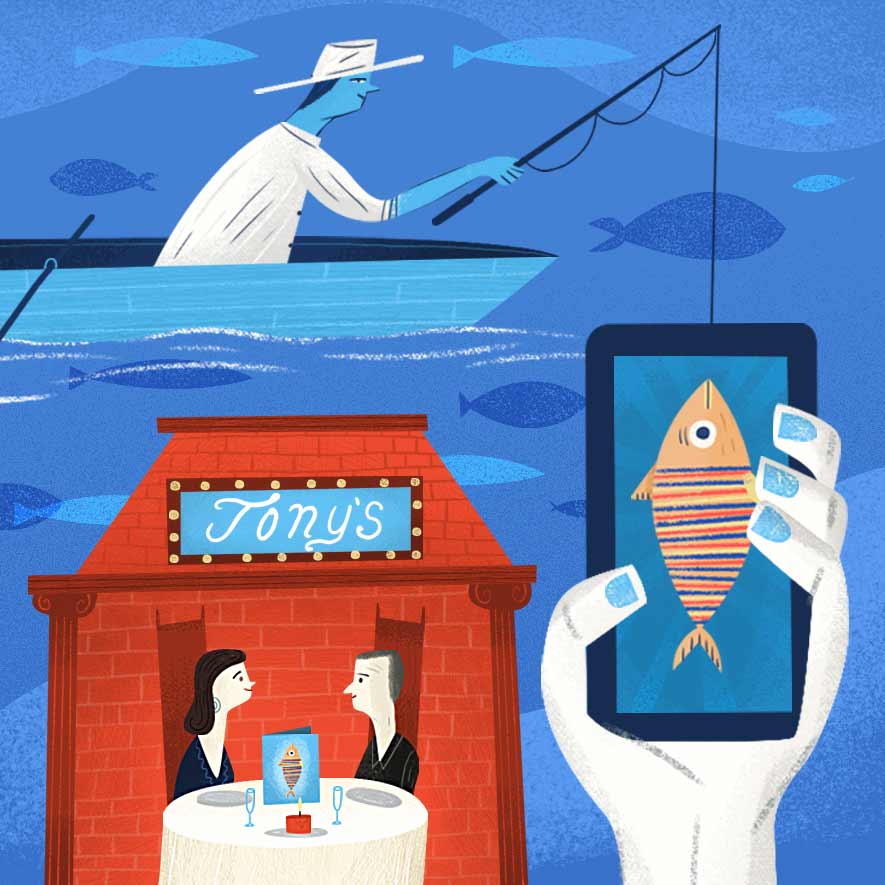Amor a Mar is a new application that allows consumers to buy the best seafood directly from local producers and fishermen on the coast of Baja California (Mexico). Every kilo of seafood that is extracted from the ocean is treated responsibly and is fished specifically for a given consumer. The main objective of the project is to change consumption habits, thereby reducing large-scale fishing, improving the working conditions of local fishermen and providing better quality seafood.
Under my academic guidance, EGADE Business School students Saraí Núñez Gutiérrez, Cecilia Medina Gutiérrez, Alejandra Halún Cavazos and Alejandro Cueva Palazuelos researched the business innovation behind the Amor a Mar app, earning the 2018 Flourish Award. They received this recognition in the category of Global Goal # 14, Life below Water, one of the 17 categories that celebrate progress towards the 17 United Nations Sustainable Development Goals. But what is the basis of this sustainable and innovative model?
Avoiding overfishing
The innovation of this application lies in its allowing customers/consumers to order seafood (Saturdays, Sundays and Mondays) that local fishermen will fish for them. To do this, the application creates a "link" between consumers in Monterrey (Nuevo León) and producers and fishermen in Ensenada (Baja California). When they enter the application, consumers can select which products they would like to order. The products may come from open-sea fishing or from fish farms established in the ocean with fish and marine fauna living in their own habitat. This project is compatible with marine life, since the fishermen and producers only fish what is ordered, and do not overfish or exploit the ocean.
It is a true win-win situation: fishermen receive more for their products, eliminating distributors from the equation; and consumers get fresh fish ready to be picked up a few days after they order it.
Amor a Mar is motivated by the need to raise awareness about responsible food consumption, seafood distribution and the working conditions of fishermen, in order to assure efficient resource management.
App owner Daniel Valles’ inspiration began when he opened the Black Market Restaurant. He wanted to differentiate himself from the competition with unique ingredients and demonstrate more sustainable ways of consuming seafood using all parts of the fish. Over time, his innovative idea expanded to the origins of fishery products, the possible impact on Baja California fishermen, food consumption patterns and the distribution process. "These two things go together, the Black Market Restaurant and Amor a Mar. One could not exist without the other," says Valles.
How has Amor a Mar impacted the fishing-consuming environment?
• Impact on the local fishing community and consumers: With this new application, the local fishing community is paid much better than by the distributors ("intermediaries"), and Monterrey consumers who use the app get much more quality and fresher fish than they would in the supermarket (the fish is caught a couple of days after they place the order).
• Impact on the overexploited supply chain: This application prevents large-scale fishing and the exploitation of the sea. About 85% of the world's fish stocks are overexploited, depleted, fully exploited or recovering from exploitation. Catches in the tropics are expected to decrease by 40% by 2050, but around 400 million people in Africa and Southeast Asia depend on fish for protein and minerals. Given that climate change is expected to have an impact on agricultural production, people will have to depend more than ever on fish for their nutritional needs (Vince, BBC, 2012). This model will help to stop the decline in fish stocks.
• Impact on consumer awareness: Amor a Mar is promoting a significant change in the lifestyle of consumers. Before, they would buy fish at the supermarket without knowing where it came from, when it was fished and what kind of chemicals had been used as preservatives. Now they can order exactly what they will consume and know how the fish was caught.
A sustainable model
The Black Market Restaurant and Amor a Mar have been able to differentiate themselves from their competitors. The restaurant has been educating consumers about the use of every part of the fish for nine years, thus minimizing waste. The business model is based on promoting high quality foods linked to consumer awareness. The restaurant has a pleasant atmosphere where people can enjoy a delicious meal, while the application is user friendly and well designed, and offers different payment methods that help generate sales. "You can have fish on your table," says Valles, "and at the same time you can make an impact."
Amor a Mar, as a business model, helps address one of the United Nations Sustainable Development Goals (SDGs) directly, and indirectly supports many others. The main goal, Number 12, Responsible Production and Consumption, aims to change seafood consumption habits.
Consumers must recognize the cost of having supermarkets full of fresh food without their wondering where it comes from and how much waste it generates. Moreover, the current food surplus directly contributes to the unequal distribution of food. Citizens in rich countries are unlikely to go hungry during a food crisis, since they only spend a relatively small amount of their income on food. However, many families in poor countries spend up to 80% of their income on food. If the price of certain foods doubles, these families will no longer be able buy them. Generating awareness of responsible consumption helps contain prices.
The Amor a Mar model also supports SDG 8, Decent Work and Economic Growth, by assuring more favorable conditions for local fishermen. It ensures that wages are paid on time, that they are fair and that the sea is treated with the right strategies to avoid fishing or damaging other species in the marine habitat. Moreover, it also contributes to SDG 14, protecting Life below Water.
App available at App Store or through Google Play.
